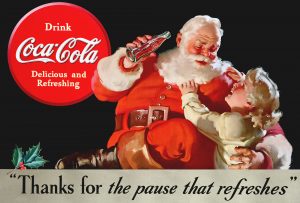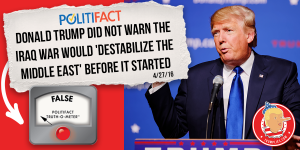A recent encounter reminds me that notions of knowledge and how it is gained can be subjective. I was told by a young person  that a documentary watched by their mother—they didn’t even see the documentary themselves—argued that there was widespread geological evidence for the biblical flood. They were not being facetious and they meant physical rather than textual evidence.
that a documentary watched by their mother—they didn’t even see the documentary themselves—argued that there was widespread geological evidence for the biblical flood. They were not being facetious and they meant physical rather than textual evidence.
I wasn’t sure how to respond. I suggested that the documentary sounded like a Christian documentary (Likely Is Genesis History?), rather than one which was interested in presenting the findings of archelogy and geology. They insisted it was true, and that left me with no answer. Instead, I began to wonder what would inspire them to argue vehemently about the truth value of a documentary that presumably they hadn’t watched themselves. This situation is a familiar one, for we live in an age with so little respect for the hardworking academics and technicians who are trying to give us a better understanding of our actual world that we indulge in every passing fantasy and whim. Unfortunately, there are powerful forces with a vested interest who are there  to assist the fantasy just like the weather channel and Norad and the neighbourhood mall encourage the sightings of Santa, presumably for the delight of children.
to assist the fantasy just like the weather channel and Norad and the neighbourhood mall encourage the sightings of Santa, presumably for the delight of children.
This post-fact world, or largely-disinterested-in-science world is a mecca for those whose beliefs have no foundation. They can merely deliver their opinion and it will be received by their easily led market in any direction they wish. Once my opinion becomes as good as your fact, then the myths of the past can enter the public imagination just as easily as they did before the enlightenment, when most people in Europe lived in hovels outside of massive cathedrals  and sweated to support obviously wealthy institution. At the time, that made sense to them, but only because they were too ignorant to know they were being scammed.
and sweated to support obviously wealthy institution. At the time, that made sense to them, but only because they were too ignorant to know they were being scammed.
This also means that other groups, even less savory if that’s possible, such as white supremacists, holocaust deniers, flat-earthers and birthers, can promulgate their masquerade of propaganda and silliness without challenge. In the recent American election, even if we set aside reports of Russia tinkering with the received  information of Americans by infesting their social media with ridiculous news stories, Trump’s own erroneous statements are a cause for concern. Nearly daily he tweets nonsense, and there is no system in place except the public themselves to fact-check his statements. On national television he makes statements that are patently untrue, and which could be easily checked at the network level, but pleading that they don’t know how to handle a president who either lies, or doesn’t know the difference between what he is saying and reality, the news networks are at a loss.
information of Americans by infesting their social media with ridiculous news stories, Trump’s own erroneous statements are a cause for concern. Nearly daily he tweets nonsense, and there is no system in place except the public themselves to fact-check his statements. On national television he makes statements that are patently untrue, and which could be easily checked at the network level, but pleading that they don’t know how to handle a president who either lies, or doesn’t know the difference between what he is saying and reality, the news networks are at a loss.
The more biased news networks are a different matter. They have a deliberate agenda which they support mainly by repetition and debasing journalism to he-said-she-said  pundits arguing like children. Their credible market is made up of those who have already contaminated their minds by their Facebook information bubble, and therefore are ripe for convincing statements which support their prejudices.
pundits arguing like children. Their credible market is made up of those who have already contaminated their minds by their Facebook information bubble, and therefore are ripe for convincing statements which support their prejudices.
My American friend recently was expounding to me about Muslims. It has been a few years since I have spent time with him so I was surprised. Perhaps his other friends who see him more regularly were present for the slow progression, but I had missed the intermediary steps, the missing link that made him sound like a rabid racist. He was asking me a series of inflammatory questions in order to scare out of me an agreement that Muslim-majority countries are more misogynist, brutal, and generally frightening than the Christian-majority countries  like his own. My main interest was summed up in my question to him about why he suddenly cared about Muslims. I’ve never heard him express any concern before, so I asked him if he was now working with a bunch of Muslims and they were treating him poorly. “Where do you get your ideas about Muslims?” I asked him. He responded by asking me about Saudi Arabia, and Iraq, countries he would be hard-pressed to point to on a map, but was full of ideas about. He had Google ready to draw and shoot, but I was persistent in my original question.
like his own. My main interest was summed up in my question to him about why he suddenly cared about Muslims. I’ve never heard him express any concern before, so I asked him if he was now working with a bunch of Muslims and they were treating him poorly. “Where do you get your ideas about Muslims?” I asked him. He responded by asking me about Saudi Arabia, and Iraq, countries he would be hard-pressed to point to on a map, but was full of ideas about. He had Google ready to draw and shoot, but I was persistent in my original question.
“How could you suddenly be so concerned with women in Azerbaijan if you never were before?  What has changed?” I asked him. “What new information have you received, and more importantly, who did you receive it from?” I have only travelled in two Muslim-majority countries, Malaysia and Indonesia, and I never noticed any difference tied to religion in those countries any more than in any other South East Asian country, but at least I had been in one. Also, since I have Muslim friends and teach Muslim students, I’ve had some interaction with them. He couldn’t claim the same. He strove to remember and finally said that a guy at work might be Muslim, he didn’t know. “Is he particularly rabid?” I asked. “Lazy? Violent?”
What has changed?” I asked him. “What new information have you received, and more importantly, who did you receive it from?” I have only travelled in two Muslim-majority countries, Malaysia and Indonesia, and I never noticed any difference tied to religion in those countries any more than in any other South East Asian country, but at least I had been in one. Also, since I have Muslim friends and teach Muslim students, I’ve had some interaction with them. He couldn’t claim the same. He strove to remember and finally said that a guy at work might be Muslim, he didn’t know. “Is he particularly rabid?” I asked. “Lazy? Violent?”
I didn’t mean for my friend to re-examine all of his ideas about Islam, but I had made him curious with my one question about why he now cared about the question although in general his life was obviously unaffected. He began to ponder the question and soon isolated it to the media he was watching. He thought he would not be affected by the news, as biased as it was, but ideas are contagious, and while he was watching for bias, he was being told over and  over again facts laced with cyanide. He had come out of the American news system worrying about Muslim-majority countries when in fact he is not the type to care about anything outside his own state, and rarely outside his own house and workplace.
over again facts laced with cyanide. He had come out of the American news system worrying about Muslim-majority countries when in fact he is not the type to care about anything outside his own state, and rarely outside his own house and workplace.
The messages around us are insidious, whether it is the documentary ostensibly watched by our mother or the news which tells us who to hate and why. With the internet such lies have long legs, and before their facts have a chance to be checked, they are in the serving dishes of many millions of people who are gullible and waiting for something to tell them what they should be thinking. Right now, the system runs amok. Someone posts a picture of their neighbour’s child and claims they have gone missing and millions of well-intentioned people spread the message far and wide. The disclaimer that follows, which asks them to please desist, is sometimes seen as an attempt to hide the truth, and still others see it as evidence that all reports are lies.
This is rather a long way of asking if as a culture, or series of cultures worldwide, we need a body of fact checkers. The journalists were supposed to do that for us, they were supposed to look through each story and ensure that it passed muster, but even if some of them are still doing their job, they are easily bypassed in the days where the president tweets to his vapid audience directly, and internet memes get mistaken as  truth. Given our rather more grim situation, should we require that any post online go through a fact-checking procedure? This rouses cries of control of information and censorship, but in fact that seems to be just what we need. Until we have everyone educated in how to educate themselves, until we have explained how to be a critical thinker, if that is even possible given such a huge and unwieldly populace, they might need a nanny to check over what’s in the children’s books of their nightly news and daily downloads.
truth. Given our rather more grim situation, should we require that any post online go through a fact-checking procedure? This rouses cries of control of information and censorship, but in fact that seems to be just what we need. Until we have everyone educated in how to educate themselves, until we have explained how to be a critical thinker, if that is even possible given such a huge and unwieldly populace, they might need a nanny to check over what’s in the children’s books of their nightly news and daily downloads.
Right now we have a rather ineffective system of checks and balances on our information, and it is only as effective and coherent as our friends. We have the vague and most times thoughtless ridicule of others. Once someone passes on a piece of information, it is subject to the very world which would promote or ignore it. If it is ridiculed enough, it dies the death of a thousand times it is ignored. If our system is filled with people like ourselves, not surprisingly, they forward our nonsense to their friends, who are similar people, and we give life to something that should have been halted at the first stroke of the pen.
it dies the death of a thousand times it is ignored. If our system is filled with people like ourselves, not surprisingly, they forward our nonsense to their friends, who are similar people, and we give life to something that should have been halted at the first stroke of the pen.
Unfortunately, this system’s downfall, as I suggest above, is that we need to be the Competent Receiver that H. G. Wells wanted us to be in the 1930s when he was worrying about the coming war and most people were suffering through the depression. If we have millions of people pushing and pulling at their own agenda until it is red and sore looking, then we might want to educate ourselves before we are victims to holocaust denial trolling, white supremacy vitriol, and religious buffoonery. If Santa is real, let him from out from behind the mall’s Christmas display,  and declare himself. If he does not, then let us send a firm message to those who would promulgate such messages—like the weather channel’s claim that he has been seen on radar crossing the north pole—to let the fantasy die it deserved death.
and declare himself. If he does not, then let us send a firm message to those who would promulgate such messages—like the weather channel’s claim that he has been seen on radar crossing the north pole—to let the fantasy die it deserved death.
If we don’t have fact checkers on our networks silencing Trump’s mouth when he is lying, or disallowing Christian broadcasting masquerading as facts, then we need to be responsible viewers ourselves. Just because we want something to be true, doesn’t mean we have the right to send that information to our friends. Wishful thinking should not be confused with facts. If there is no hard evidence that the world-wide flood ever happened—and there isn’t—then keep the fantasy to yourself and do not contaminate the information pool for everyone else. It’s hard to avoid inflicting our fantasies on our neighbours and friends, but we have to remember that we do not have the right to corrupt the archive for future generations. If there is no evidence for something we’d like to be a fact, can we really justify teaching that to gullible people, or children,  knowing that we are lying about it being true? If there is no evidence for prayer being an effective treatment—see Why God Hates Amputees—then we would be better praying in the shame of our own homes than making sure that a deliberately lie gets any further currency.
knowing that we are lying about it being true? If there is no evidence for prayer being an effective treatment—see Why God Hates Amputees—then we would be better praying in the shame of our own homes than making sure that a deliberately lie gets any further currency.
How we become competent receivers is no doubt an arduous process that begins—and Wells was right about this—with a general education and ends with self-education that is an ongoing life-long process. We can begin that process today, but going through our own assumptions about Muslims, prayer, the flood in Genesis, holocaust denial, white supremacy, refrigerator lights, sunspots and climate change, contrails behind jets, the use of fluoride, vaccines, a New World Order, UFOs, homeopathy, auras, flat-earth, weather control, the world trade centre bombing, and examining them for evidence. We need to give those assumptions the same scrutiny that we reserve for ideas we dislike, or when the bank says we made a withdrawal when we insist we didn’t.
Apply that same rigor we did as children when we examined the Facebook bubble of Santa being real with what we knew about reality, and then relegated Santa back to the toy box where such ideas belong. If you still believe in Santa, that is another matter, and you can believe me when I make the baseless claim that there is help out there.
